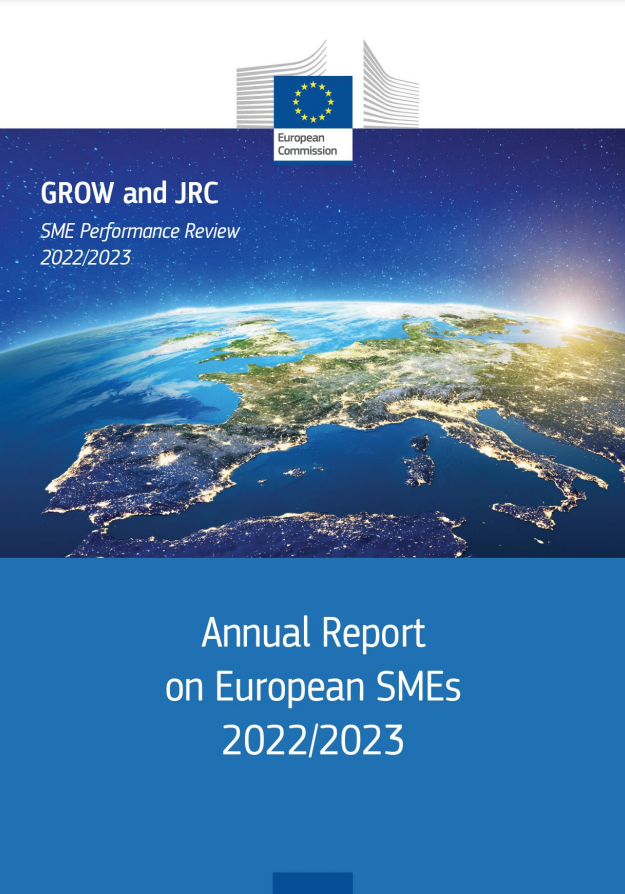
Small and medium-sized enterprises (SMEs) form the backbone of Europe's economy, contributing significantly to job creation, innovation, and economic growth. To monitor and assess the progress of SMEs, the European Commission publishes an annual SME Performance Review. The recently released 2022/2023 report offers valuable insights into the challenges and opportunities faced by SMEs in the European Union. In this blog post, we will look at the key findings of the review and shed light on the current state of SMEs in Europe.
The past few years have presented unprecedented challenges for SMEs globally, with the COVID-19 pandemic wreaking havoc on economies. In the EU, SMEs faced economic uncertainty, hiring difficulties, inflation, interest rate rises, and increased energy and raw material costs. The withdrawal of government financial aid, coupled with the impact of Russia’s war of aggression in Ukraine in certain regions, further intensified the fragile situation of SMEs. Additionally, SMEs had to adapt to the digital and sustainable economy, adding another layer of complexity to their operations.
Reviewing SME performance
Despite the challenging circumstances, the SME Performance Review indicates some noteworthy observations. In 2022, EU-27 SMEs showed growth in terms of value added in the non-financial business sector (NFBS) by 6.7% in current prices. However, when adjusting for inflation, the value added actually declined by 2.3%. Although SME employment increased by 2.4% in 2022, it did not fully recover from the pandemic-induced losses, lagging behind the pre-pandemic performance in 2019.
The projections for 2023 paint a challenging picture for SMEs in the EU. It is expected that inflation-adjusted SME value added in the NFBS will decrease by 1.2%, while SME employment is projected to fall by 0.2%. These forecasts reflect a difficult environment for SMEs, with anticipated performance similar to that of large enterprises.
Positive trends and resilience
Amidst the adversity, the review highlights some positive trends and resilient segments among EU SMEs. Micro SMEs with less than 10 employees have outperformed their larger counterparts, exhibiting impressive employment growth. Furthermore, certain industrial ecosystems experienced real-term value added growth in 2022, particularly in the "tourism" and "proximity, social economy, and civil security" sectors. Additionally, technology-intensive SMEs displayed remarkable increases in value added, employment, and the number of SMEs between 2020 and 2022.
Recognising the challenges faced by SMEs, the European Commission announced an EU relief package to complement existing support programmes. This relief package aims to alleviate some of the burdens and foster growth opportunities for SMEs. Furthermore, the SME Performance Review acknowledges the pressing issue of skill shortages, which has become a major obstacle for SMEs across the EU. Upcoming DG GROW Eurobarometer surveys will provide insights into this problem and suggest potential policy options.
Check on SME development at SME Week
In the spirit of promoting entrepreneurship and innovation, the European SME Week is set to take place from 13 to 17 November 2023 in Bilbao. This annual event, incorporating the SME Assembly and the Europe Enterprise Network Conference, offers a unique platform for SMEs to connect with partners, investors, and industry experts. Attendees can look forward to engaging events, including the European Enterprise Promotion Awards ceremony, which celebrates outstanding achievements in entrepreneurship. Visit the EU's Promoting Enterprise portal for more information on how to participate and make the most of SME Week. We look forward to seeing you there!
Details
- Publication date
- 10 July 2023
- Author
- Directorate-General for Internal Market, Industry, Entrepreneurship and SMEs
- Promoting Enterprise - categories
- Promoting Enterprise News
- Promoting Enterprise - tags
- SMEs
- European SME Week
- Entrepreneurs
- Europe
